
Do you like the sound of moving water? Do you find the sound relaxing? Well, you can easily create the sound of moving water in your own garden. You can put in a fish pond or a water garden. So, if you think that your garden requires landscaping, it might be a good idea to consider a fish pond or water garden.
People believe that a fish pond takes lot of looking after, but that is not inevitably the case. The truth is that the larger the fish pond, the less work you have to put into it. This is because a big pond can create its own ecosystem, whereas a small fish pond requires help.
The ways that you can help a small fish pond be a good environment for your fish are as follows:
Pond Filters – use a pond filter with a good pump. Do not forget that you could get a solar powered pump. It will save on the environment and on your wallet. You should use a pond filter on a small pond, because the ecosystem cannot cope with all the plant waste of a small ornamental pond on its own. A pond pump will feed the filtration system and a waterfall or fountain if you want.
Your pond filtration system should be left running twenty-four hours a day, but you can not just set it and forget it. Make sure that the pump is running daily and keep the filter as clean as necessary for it to do its job. You may find that you have to clean it two or three times a week in the summer and autumn but only once a week in the winter and spring.
Leaf Netting: stop leaves from clogging up your pond in the autumn. The net should be suspended a foot or so above the pond to stop autumn leaves falling into the water and decaying.
Feeding: all fish should be given fish food, not bread or scraps. Some fish ought to have specialized fish food in order to maintain their colour. When you buy your fish, the salesperson should inform you what they eat. In general, the larger the pond the less trouble feeding becomes as they will eat natural food like insects, grubs, larvae and flies.
Fish need less food in the winter when they become semi-dormant and live off the fat stores that they built up in the warmer months, so give food often in the summer and autumn, but less often in the winter. You must check to see if excess food is left floating on the surface.
Winter: make sure that there is a hole in the ice so that the water can take in oxygen and the fish can feed if they wish to. You can buy a floating de-icer or some people float a round football in a hoola-hoop, which seems to work unless the temperature gets very low.
In fact, the hoola-hoop is a good idea all year round actually. If you place the food in the hoop, it stays in one place and you can see if you have given too much. It also makes a nice site to see all the fish feeding in a group.

Source by Owen Jones
 Vitamin Agent The Health & Naturalistic Source
Vitamin Agent The Health & Naturalistic Source





